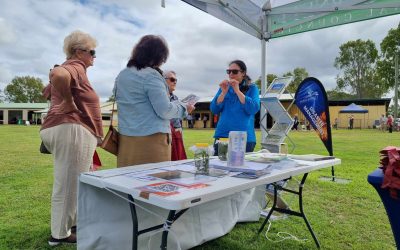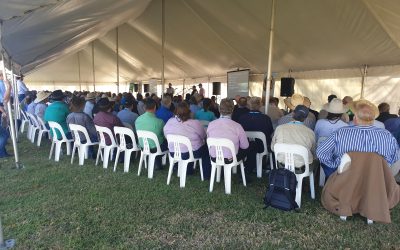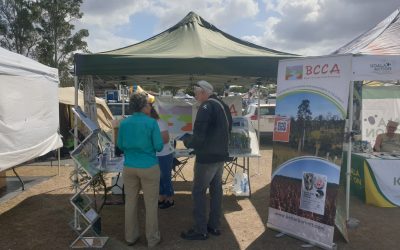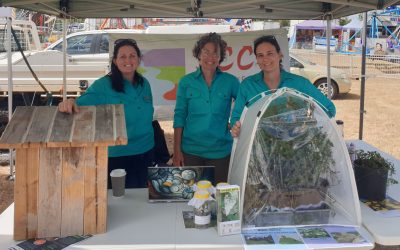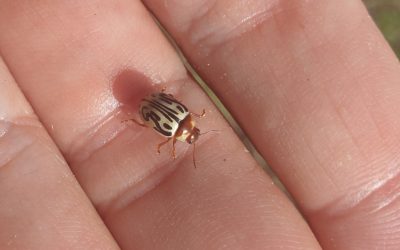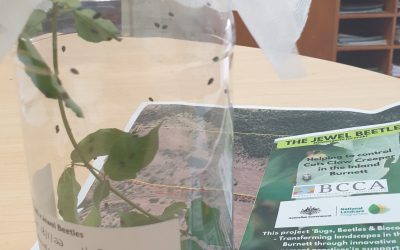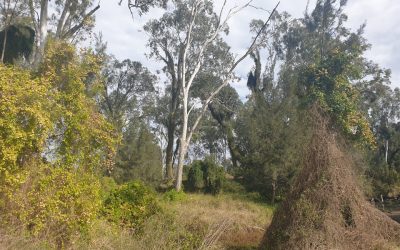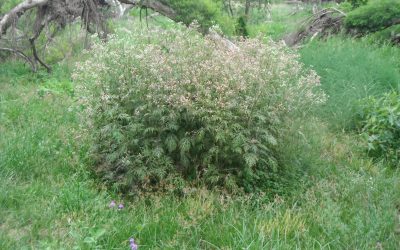Bugs, Beetles and Biocontrol
Transforming landscapes in the Burnett through innovative management practices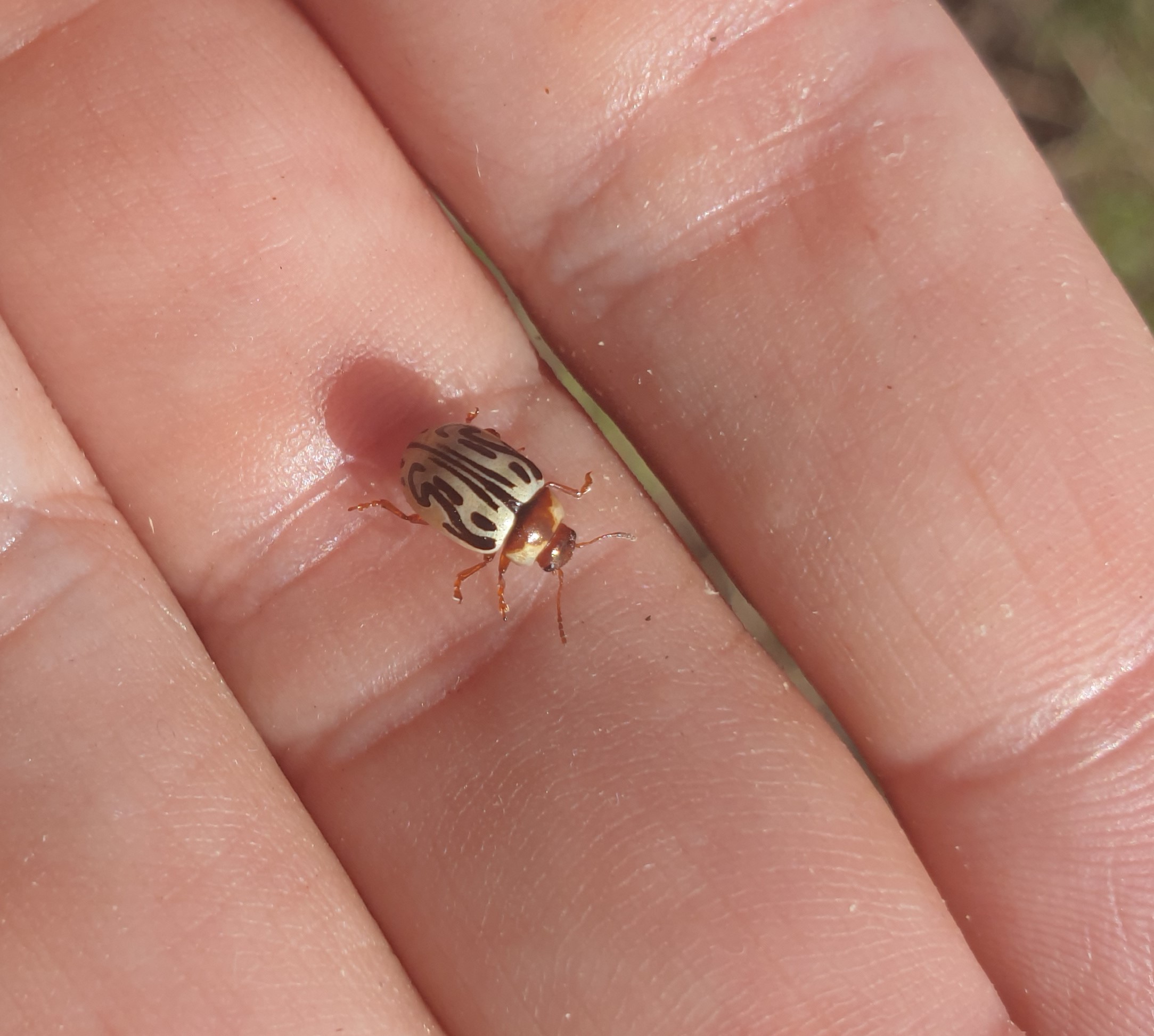
2021—2024
Investment: $117,638
Funding body: Australian Government’s National Landcare Program
Project purpose: Create a long-term and sustainable management of Parthenium and CCC in the Inland Burnett Region via the production and use of multiple effective biocontrol agents
Key achievements:
-
-
-
- Bred and distributed over 15,000 Jewel Beetles at 58 release sites
- Bred and distributed over 3,000 Tingid bugs at 20 sites
- Distributed parthenium biocontrol’s at 20 release sites
-
-
This project advanced a range of biocontrol solutions that challenged traditional approaches and improved the management of two established weed species—Parthenium and Cat’s Claw Creeper (CCC)—in the Inland Burnett. It aimed to deliver long-term, sustainable management of these invasive weeds through the production and use of multiple biocontrol agents.
A biocontrol breeding facility was established at Monto, which produced CCC biocontrol agents including the Jewel Beetle and the Tingid Bug. CCC has widespread impacts on native ecosystems, particularly riparian zones, and interested landholders received bottles of 100 agents for release over three seasons.
The project achieved significant outcomes, including the distribution of over 15,000 Jewel Beetles across 58 release sites managed by 42 landholders, two Landcare groups, local council, and Queensland Parks and Wildlife Services (QPWS). Collectively, these participants managed more than 56,000 hectares across 21 river and creek systems. Notably, collaboration with QPWS allowed releases within sensitive areas such as Cania, Kroombit Tops, and Coominglah National Parks. Of all release sites, 47% had Jewel Beetles released for three seasons, 31% for two seasons, and 22% for one season. Monitoring showed 75% of sites had beetles established after 12 months, while persistence was confirmed at 65% of sites following the second release.
An extension of the project allowed 10 new landholders to participate and introduced the Tingid Bug, with over 3,000 agents released across 20 sites by landholders who collectively managed over 22,000 hectares of land, over 15 different waterways.
Parthenium, one of Australia’s most invasive and damaging weed species, has significant environmental and economic impacts including reduced livestock productivity, biodiversity loss, plant disease risks, and human health issues. Nationally, nine insects and two rust fungi are available as biocontrol agents, though eradication was not possible. Instead, a combination of agents were used to suppress growth by attacking different parts of the plant. At least three Parthenium biocontrol agents were already present in the Inland Burnett, and others were harvested for release from Central Queensland. New releases included the Zygogramma bicolorata beetle, Winter Rust, and Summer Rust across monitoring and landholder sites.
Parthenium agents were redistributed to 20 sites by landholders and local council who collectively managed over 15,000 hectares of land. While the Zygogramma bicolorata beetle and Winter Rust had limited success, a final large release of Summer Rust near Monto achieved strong establishment and visible suppression of Parthenium, laying the foundation for a future collection site to support ongoing regional control.
Focusing efforts on the upper Burnett River catchment provided long-term benefits, reducing weed reproductive material and enabling biocontrol agents to migrate downstream, amplifying the project’s impact across the catchment.
Resources

Program News

BCCA out and about in the Burnett
BCCA attended 3 North Burnett Shows (Monto, Eidsvold and Mundubbera) and set up with NBRC Recovery Officer, SES and Rural Fire to provide information and support to producers including soil mapping info, grants available, technical support, biocontrol agents, weed and...
Brian Pastures Field Day
BCCA attended the Brian Pastures Field Day last week and with over 200 people in attendance, gave us the opportunity to showcase some of our current project at our trade stall. Particularly our biocontrol project which involved breeding biocontrol agents for Cat's...
Off Grid Lifestyle Expo – Goomeri
On the weekend, BCCA attended the Off Grid Lifestyle Expo in Goomeri to share information about sustainable agriculture, land management and conservation on private lands in the Burnett Catchment. Over 120 interested individuals visited our stall over the 1.5 days and...
BCCA @ the Monto Show
BCCA's Katie Muller, Misty Neilson and Melinda Clarke, attended the local Monto Show on Saturday 22 April. We saw 43 interested individuals come through out stall. The public were able to view our Greater Glider nesting boxes, constructed by the Monto Men's Shed,...
Parthenium biocontrol released in the Inland Burnett
🐞Zygogramma bicolorata, also referred to as the Parthenium beetle or Mexican beetle, is native to Mexico but has been introduced as a biocontrol agent for Parthenium since the 1980's in Australia. The beetles are host specific and only eat and breed on Parthenium. ...
Jewel Beetles released into the Inland Burnett
𝐂𝐚𝐭𝐬 𝐂𝐥𝐚𝐰 𝐂𝐫𝐞𝐞𝐩𝐞𝐫 (CCC) is a long lived perennial vine native to Central and South America. It was introduced into Australia as an ornamental garden plant because of its vigourous growth and large, bright yellow, bell-shaped flowers it produces in spring. The vine...
Get involved in our Biocontrol Program
Burnett Catchment Care Association (BCCA) received a National Landcare Program – Smart Farms Small Grant to establish biocontrol breeding facilities in Monto. The facility will be used to produce biocontrol agents for Cats Claw Creeper (CCC) and Parthenium....
New Biocontrol project for BCCA
Burnett Catchment Care Association were recently successful in receiving a National Landcare Program – Smart Farms Small Grants Round 4 grant. Our project - ‘Bugs, Beetles and Biocontrol – Transforming landscapes in the Burnett through innovative management practices’...
Program Sponsors
This project was supported by the following partners and investors.







